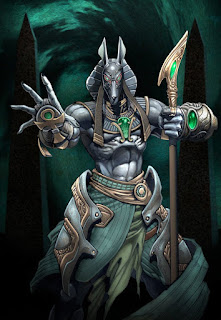God of Death and Mummification: Anubis
Lord of the Funerals
Keeper of the Ways of
Death
God of Burial and
Embalming
God of Cemeteries and
Mummification
Anubis is known as the god of death and is one of the oldest and
most popular of ancient Egyptian deities. The ancient Egyptians revered Anubis
highly because they believed he had tremendous power over both their physical
and spiritual selves when they died.
References to Anubis are found in texts dating back to the
Old Kingdom. His fame lasted until the Middle Kingdom, when his role as God of
death was taken over by Osiris and Anubis became Osiris' assistant.
 |
| Nephthys: his mother |
He is the son of Nephthys and Set or Osiris. It was believed
that his aunt Isis raised him, rather than his mother Nephthys, as Set might
murder his wife's illegitimate son or be a horrible influence on him. Thus he
grew up as a son, friend and follower of Osiris and Isis. Despite the fact that
he was given to Osiris and Isis to raise, Anubis is aware of his true parentage
and says that he's "different" and not a great warrior like his
cousin/stepbrother Horus is.
Anubis Wore Many Hats as God of the Death:
The Guardian of the Scales: one of his many roles surrounding the dead
included the Guardian of Scales where he dictated the fate of souls. As
depicted in the Book of the Dead, Anubis weighs the dead’s heart against
the weight of a feather. The feather represents “Ma’at” or truth. If the scale
of justice tipped toward the heart, the dead person would be consumed by Ammit,
a female demon the ancient Egyptian people dubbed “devourer of the dead.” If
the scale of justice tipped toward the feather, Anubis would lead the dead to
Osiris so he could ascend to a worthy existence in heaven.
The God of Embalming and Mummification: Anubis held the important role of
overseeing the embalming and mummification of the dead. The daughter of Anubis
(Kebechet) is frequently seen as his assistant in the mummification process of
the dead. Ancient Egyptians believed that Anubis sniffed the bodies of the
dead, so they preserved them with sweet smelling herbs and plants. Anubis invents
in the “Opening of the Mouth” ritual to ensure a good burial. When a corpse was
mummified the priests wore jackal headed masks and prayed to Anubis. At the
tomb, the priest held the mummy during the Opening of the Mouth ceremony to
give the dead person the power to eat, move and breathe. Anubis is also the
only deity who is allowed to do the Opening of the Mouth ceremony. He also
invents the “Closing of the Mouth” ritual to shut the dead if they are too annoying.
When someone died, Anubis personally guided him or her to the underworld and
along the perilous pathways the dead had to travel before they reached the
court of Osiris to be judged.
Anubis helped Isis
bring her husband back to life again after Set had killed him. He embalmed the
body of the god, swathed it in the linen cloths that had been woven by the twin
goddesses, Isis and Nephthys, making sure that the body would never decay or
rot. Anubis preserved the body until his eventual resurrection.
Protector of Tombs: as the Egyptian god responsible for protecting the dead, many
prayers to Anubis were carved into their tombs. Anubis held this role until
Osiris gained popularity and took it over.







Comments
Post a Comment